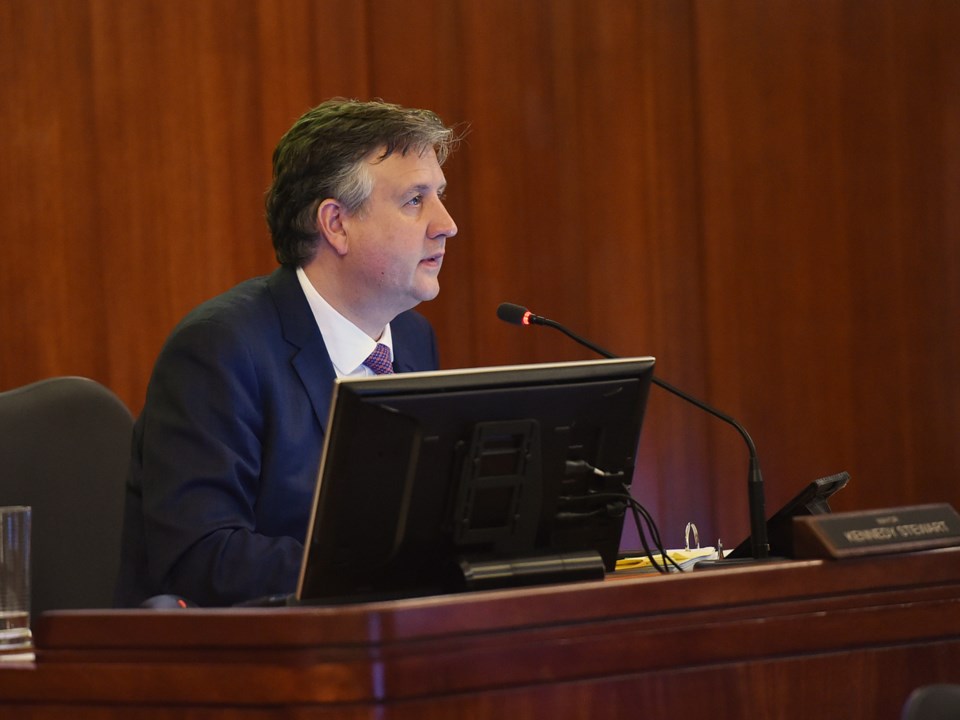Stewart made the same request in February 2020 and council ultimately approved a five per cent tax hike and $1.6 billion operating budget in December 2020.
The mayor plans to ask for council’s support Tuesday in getting staff to find cost efficiencies and savings across the organization before council’s budget vote in December of this year.
The exercise, he said, should inform multiple scenarios of property tax increases for council’s consideration — all at no more than five per cent.
“Last year, the process was so much smoother and way less stressful for the public in what was a very stressful year,” Stewart told Glacier Media Monday.
“So I thought let’s do that again this year so can staff can start their budgeting scenarios and the public can have some certainty as to what to expect.”
What to expect in terms of the city’s revenues is that they are again projected to be reduced this year because of the pandemic, possibly $70 million below the 2020 budget, according to the city's communications department.
Last year, revenues were down by $89 million after parking enforcement was temporarily halted and community centres, pools, libraries and theatres were shuttered.
More than 1,800 workers were temporarily laid off and all non-unionized staff was put on a mandatory furlough equivalent to a 10 per cent pay cut. Stewart and the 10 councillors also took a voluntary 10 per cent cut.
The current operating budget for the city is $19 million, or one per cent, less than the 2020 budget, with millions of dollars of spending also scaled back this year on capital projects.
Green Party Coun. Adriane Carr said she is less concerned about the percentage of tax hike and more interested in meeting the needs of residents.
“I’ve always stated clearly that if it takes more than five per cent to meet those needs, I need to know that information from staff,” said Carr, adding that she wasn’t convinced the mayor’s motion is necessary.
“I’d rather see staff come forward with their professional opinion on what they feel is needed in terms of a tax increase to do all the work we need to do at the city that is demanded by residents.”
Coun. Rebecca Bligh, who sits as an independent, supported the mayor’s request last year to have staff draft property hike scenarios at no more than five per cent.
The pandemic has only amplified the need to look at a tax hike that doesn’t further hurt homeowners and small business owners — while simultaneously approving a budget that assists the city’s most vulnerable, Bligh said.
“The COVID-19 impact on the budget going into 2022 cannot be understated at all,” she said.
“We don’t know whether funding from senior levels of government will dry up, whether they’ll be a federal election or what’s going to happen the rest of the year. We need to be really cognizant of the unpredictable environment we’re in, financially.”
Added Bligh: “We have to be a little bit more realistic and pragmatic when we approach this next budget.”
The most contentious issue to arise in last year’s debate was the police budget, with the Vancouver Police Department not getting an additional $5.7 million it requested.
The Vancouver Police Board has since appealed the decision via the director of police services in Victoria, saying the funding would have translated to the hiring of 61 new recruits this year.
The department’s fight to get more funding in the 2022 budget is expected to continue, with a VPD document that went before council last year suggesting an increase was necessary in the years ahead.
“The VPD’s budget is averaging a projected increase of approximately three per cent from 2022-2026 to account for estimated salary and benefit cost increases related to the operational review [of the department that recommended hiring more officers], attrition and potential future collective agreement wage increases,” the document said.
When asked how council expected to deal with a request from police for additional funding, the mayor said a five per cent tax hike would mean not every city department is going to get what they want.
Property taxes fund approximately 59 per cent of the operating budget.
The city also collects taxes on behalf of other taxing authorities, including the provincial government (school taxes), TransLink, B.C. Assessment, Metro Vancouver and the Municipal Finance Authority of B.C.
Like last year, the mayor wants to extend the deadline for property tax payments — which can be done under the Vancouver Charter — but is concerned an extension could mean the city would be on the hook for paying, for example, school taxes.
He wants the provincial government to do as it did last year and allow an extension for payment of school taxes to Victoria.
“I know a lot of other mayors who have businesses in their municipalities that are struggling due to closures [under restrictions banning indoor dining], so an extension would save a ton of businesses,” Stewart said.
The Ministry of Finance said in an emailed statement Monday that the government allowed municipalities last year to hold school taxes until January 2021.
The ministry didn’t say whether it would allow an extension for this tax year, but said municipalities “can also consider a revenue anticipation loan [which allows a municipality to borrow against its anticipated revenue for the year].”
The ministry also pointed out that on Monday it added an additional $75 million under its “circuit breaker relief program" and expanded its eligibility, “recognizing the challenges facing hospitality, fitness and accommodation sector businesses as a result of the restrictions put in place to keep people safe.”
Council’s meeting Tuesday begins at 9:30 a.m.
@Howellings



